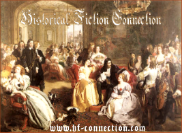3 roses
 Anyone who frequents my blog probably knows two things: I am a firm supporter of Richard III and I'm not the biggest fan of Philippa Gregory. When I saw that her second novel in The Cousins' War series would be about Henry Tudor's mother, Margaret Beaufort, I was quite anxious and worried about how Ms. Gregory would portray the entire drama and Richard. I can say, thankfully, that I have no complaints with how she showed him in this novel and, overall, it was a decent read (better, in my opinion, than the previous novel The White Queen). Having never read much about Margaret I was fairly interested to read about her early life (as I am well versed with her later years).
Anyone who frequents my blog probably knows two things: I am a firm supporter of Richard III and I'm not the biggest fan of Philippa Gregory. When I saw that her second novel in The Cousins' War series would be about Henry Tudor's mother, Margaret Beaufort, I was quite anxious and worried about how Ms. Gregory would portray the entire drama and Richard. I can say, thankfully, that I have no complaints with how she showed him in this novel and, overall, it was a decent read (better, in my opinion, than the previous novel The White Queen). Having never read much about Margaret I was fairly interested to read about her early life (as I am well versed with her later years).Margaret Beaufort was from the line descending from John of Gaunt (Edward III's son) and his mistress Katheryn Swynford (the line was eventually legitimized). She is married at 13 to Edmund Tudor but he is killed soon after, though not before managing to get Margaret pregnant. In the years after the birth of her son, whom she names Henry (high expectations already), she is married two more times, sees the reigning House of York begin to crumble, and works behind the scenes to bring her son to the throne. Everyone knows what happens at the Battle of Bosworth and that is where this novel ends. That is Margaret's history and here Gregory has stuck to known historical fact fairly decently, though I will admit, having never read too much solely on Margaret there are probably some details I would miss. However, there is nothing glaringly obvious that jumps out at me so I can say that the historical accuracy in this novel doesn't bother me like it has in so many of her other novels.
The story is told from Margaret's point of view and I feel that severely limits the story. She (Margaret) is always in England and usually at a manor in the country so not around all the momentous events that occur throughout the time frame of the story. Gregory resorts to conveying important information in letters from Margaret to various people - Henry, Jasper Tudor, etc. - in order to get her readers up to speed on what is happening beyond Margaret's sphere at the time. This really bugged me for the sole reason that someone as intelligent as Margaret would never have committed such treasonous ideas to paper and, to top it off, signed her name to it. I understand Gregory's need to fill the readers in and writing the story from a third person point of view would have solved this problem easily. Towards the end of the novel there are several chapters where she does switch to this POV out of necessity (battlefield scenes) and the story flows much better and is quite well written. Gregory has her take on what happened to the Princes in the Tower and I have no qualms with the way she portrayed the entire episode. What I do have an issue with is Margaret herself. I knew I was most likely not going to like her when, in the first few paragraphs of the novel, she is thrilled to have "saint's knees" at the age of nine and then soon likens herself as England's Joan of Arc. I have no doubt that Margaret Beaufort was a pious woman (it is well recorded actually) but I can not stand being constantly beat over the head with the information. This is an issue I have had with a few of Gregory's books. On almost every page of the novel Margaret is either mentioning how she sees herself as a Joan of Arc, sent from God to "rescue" England or discussing how because she is so pious and godly that her will must be the will of God, that she was sent from God to put Henry on the throne. This got old very, very quickly and mix that in with her arrogance and ambition and I disliked her from beginning to end. There was one moment when I wanted to clap and cheer that she finally got the right idea (when she was wondering if it wasn't all God's will but her own ambitions that she was acting on) but she soon talked herself out of that. I understand that she was an ambitious woman but it really seemed over the top to me. Beyond Margaret's ambitions and scheming to put Henry on the throne, there really is not much else to the story. Because the entire novel is basically from Margaret's point of view we really do not get a look at many of the other people that play such an important part in the story. There are, of course, scenes between Margaret and various people through out, but we really don't get a good look at these characters or what makes them tick. I think my favorite scene in the entire novel was the one between Margaret and Elizabeth of York. I loved the spunk Gregory gives the young princess and her parting comment to Margaret, after she has tried tirelessly to make the princess feel inferior, is priceless:
"Yes, but either way, shamed or not, I shall be Queen of England, and this is the last time you will sit in my presence."
The exception to this limitation would be the final few chapters where Gregory switches to a third person narrative and we see Henry and Jasper Tudor. I thoroughly enjoyed these few chapters (though I always hate the outcome) and I actually liked her portrayal of Henry Tudor. I got the feeling that he was much less impressed with his Lancaster "inheritance" (England's crown) than his mother and wasn't overly worried if he was King or not. It almost seemed like the classic case of "child doing something only because his parents want him to" - almost like Henry was only invading England and fighting Richard because his mother wanted him to be King, not because he really wanted to be or felt he had a right to it. I was prepared to hate Henry as Richard's killer but Gregory wrote him in such a way that I actually like him. It certainly throws a new light on him.
Overall I can say I enjoyed the novel more than the previous one about Elizabeth Woodville. There were, of course, things that irritated me but it wasn't a bad read. It doesn't bring any new information to the table but what was included was interesting. I think readers who want a little more background on how the Tudors came to power but aren't ready for some of the more detail heavy novels will really enjoy this; it would certainly be a good starting point if you're wanting to learn about the period. Serious Ricardians may not like it as it is told from the view point of the woman who helped take his throne. The story moves at a decent pace and it certainly covers a very dramatic time period in English history. I like the fact that it is about someone who writers usually doesn't spend too much time discussing. Gregory's next novel in the Cousins' War series will be about Jacquetta Woodville, Elizabeth Woodville's mother. She also plans on a novel about Anne and Isabelle Neville (Anne was Richard III's wife).
*Thank you to the publisher, Simon and Schuster for the early review opportunity.























I'm planning on reading this one in a few weeks - it sounds interesting and I am looking forward to it since there isn't that much writen about Margaret.
ReplyDeleteI couldn't agree more. The letters drove me nuts (boring), and as Brian said at GR highly unlikely. I wish the entire book had been third person, I might have liked it more.
ReplyDeleteDaphne ~ I believe the fact that it was about Margaret, who isn't written about often, kept me interested.
ReplyDeleteI may end up reading these eventually, but I think I have really gone off PG.
ReplyDeleteI haven't read any fiction about the war of roses period - but I do have some knowledge of the period. I haven't read the White Queen yet, but I am looking forward to them - I have always enjoyed PG's books enough. Thanks for the review.
ReplyDeleteWonderful review, I too enjoyed Elizabeth's remark to Margaret. I too got bored with Margaret it was good but limited.
ReplyDeleteI'm with Marg - have gone off PG especially since the White Queen and although I may get to this one eventually, I'm in no rush. Great review Robin!
ReplyDeleteThanks for all the comments!
ReplyDeleteMoppet ~ I'm not the biggest PG fan (obviously) but I wasn't completely turned off by this one. And I just can't help reading her stuff...its decent entertainment at least! :)